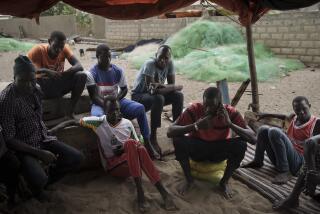Africa Crash Survivors Recall Ordeal
- Share via
ABIDJAN, Ivory Coast — Thrown into dark water amid the screams of fellow passengers from an ill-fated Kenya Airways flight, Emmanuel Madu focused on his faith--and his prowess as a chess player--to survive.
Madu, a 35-year-old Nigerian, clung to a piece of wreckage until he could grab a life vest floating by. He was one of only 10 people to survive Sunday’s crash of Flight 431.
On Wednesday, he and Samuel Aigbe told their tale of a flight that seemed to go wrong from the start.
“Within two minutes after we took off, the plane was not in balance,” Aigbe, a 25-year-old Nigerian said from his hospital bed. “It seemed the pilot was struggling to gain control of the plane.”
Kenya Airways officials said they had no reason to believe the plane had experienced any mechanical failure or that the pilots were at fault, but they stressed that their investigators would leave no stone unturned. The airline has a partnership with KLM Royal Dutch Airlines, and the crash was Kenya Airways’ first since it began operating in 1977.
“It is difficult to state at this time exactly what happened,” said Richard Nyaga, executive director of Kenya Airways. He added: “The investigation is now starting. We have the experts. They are looking at all aspects . . . including human error. Nothing will be neglected.”
Recovery teams Wednesday located the flight data recorder--one of the plane’s “black boxes”--and would attempt to retrieve it today, said Jean Abonouan, Ivory Coast’s civil aviation director. He said they used special equipment sent from France.
The currents off Ivory Coast and much of West Africa are notoriously strong and regularly drag unwary swimmers out to sea. Searchers believe much of the plane’s wreckage has already been dispersed along the coast.
One hundred sixty-nine passengers and crew members were killed when the Airbus A-310 plunged into the Atlantic. Most of the passengers were Nigerian, though the flight manifest included nationals from at least 23 countries, including the United States.
Aigbe recalled that passengers were anxious to depart Abidjan, the commercial capital of Ivory Coast, where they had been delayed for six hours “with no reception, no good treatment, no information.”
The flight originated in Nairobi, Kenya, and was meant to stop first in Lagos, Nigeria, but it flew directly to Abidjan because of bad weather.
Aigbe said the flight was packed and that several people--including himself--found their seats had been assigned to more than one person.
When the plane took off, the pilot seemed to wrestle with the controls, and the plane tilted from side to side, he said.
“The next thing we knew, the oxygen masks came down,” said Aigbe, a recent graduate in political science and public administration from a Nigerian university. “There was no news from the pilot or the crew. There was a spark, and the lights went out. It sounded as if we hit something; and then it was as if we were flushed from the plane into the water, like when you flush a toilet.”
Madu, an engineer who escaped with only cuts and bruises, recalled that “the plane’s engine just didn’t sound right. It wasn’t flowing. I knew there was a problem.”
Madu said the pilot seemed to rev the engine too high over a short period, as if he was struggling to get enough power. Then there was a loud rattling sound, and the plane seemed to spin in the air, Madu said.
“Then I suddenly found myself in the water,” he said. “There was pandemonium. Everybody was trying to hold on to something.”
Aigbe, who fractured his right foot and suffered a severe gash in his right thigh, said he tried to keep himself afloat and conserve energy.
“Everybody was screaming,” he said. “People were calling God and confessing their sins. Some people just gave up.”
Left in nothing but his trousers and socks, Aigbe said, he thought he would freeze.
Madu turned to God and his skills as a chess player to gain strength.
“I saw this as a game of chess between death and me,” he said. “I said, ‘I’m going to use all that I’ve got to win.’ I saw this as an opportunity to test the endurance of my spirit.”
Madu floated on a piece of wreckage until he was able to grab a life jacket. He inflated it, put it around his neck, and pressed on the light to illuminate the blustery, dark waters. He was soon fished out of the ocean by rescuers.
Most of the other passengers were less fortunate. Kenya Airways said that 89 bodies had been recovered by Wednesday afternoon and that 26 of them had been positively identified.
The airline had asked relatives to provide recent photographs, dental records, descriptions and information on possible birth marks to help identify the remains.
Binay Kumar Dutta, a banker, spent most of Wednesday trying to locate the body of Lal Gaurish Pratap Singh, a father of two and a manager of the State Bank of India, who had been on his way to a meeting in Lagos.
Dutta went to the city morgue with a photocopy of the passport of his colleague, details of the clothes he was wearing and a list of his distinct physical features--such as a false tooth--that might help with his identification.
Dutta said Singh’s family was anxious to bring the body back to India so cremation and the formal Hindu burial ritual could proceed.
At the hospital, Aigbe and Madu embraced and congratulated each other on staying alive. “For me, it was a miracle,” Aigbe said.
More to Read
Sign up for Essential California
The most important California stories and recommendations in your inbox every morning.
You may occasionally receive promotional content from the Los Angeles Times.














